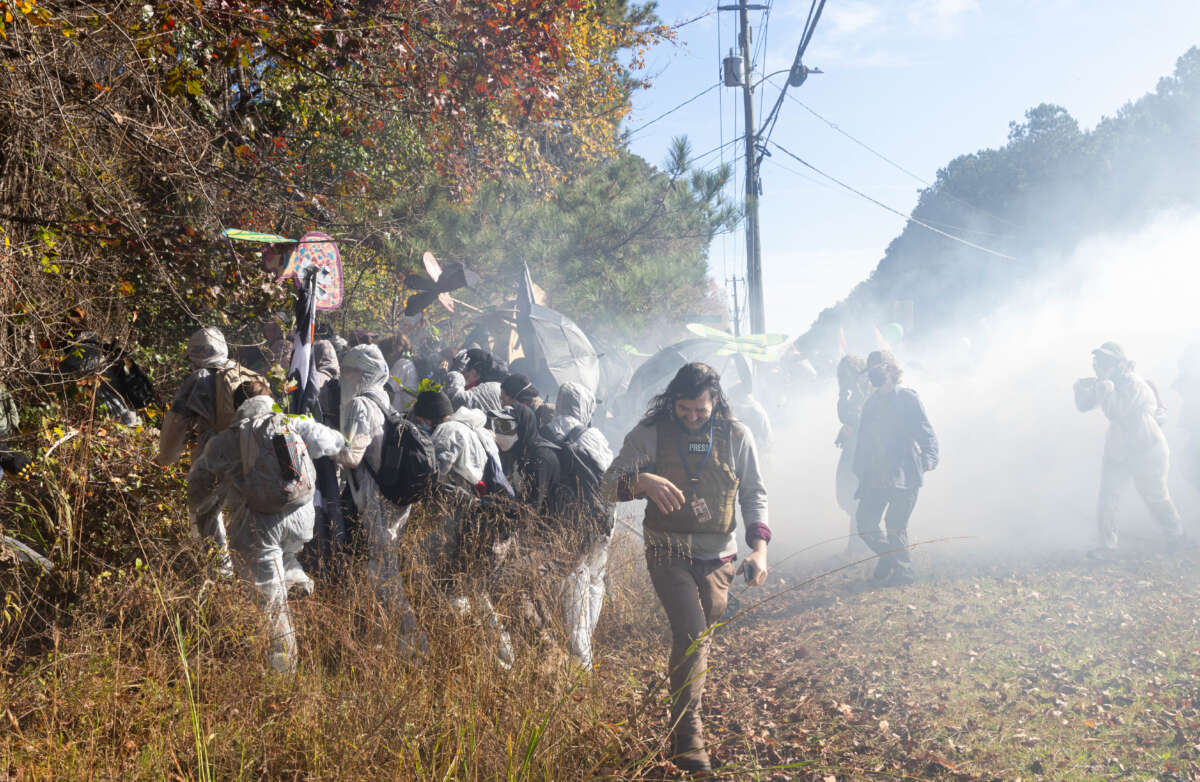Honest, paywall-free news is rare. Please support our boldly independent journalism with a donation of any size.
An estimated 500 activists converged from around the country to march this week on the construction site for the police training and militarization facility dubbed “Cop City.” The breach of the Cop City site was planned as a direct rebuke of police and prosecutorial retribution against the movement: a demonstration that organizing will continue despite retaliation against activists; that repression can’t kill the movement.
On November 13, the “Block Cop City” march began jubilantly. Activists waved dozens of puppets overhead, including insects with anti-Cop City slogans, a bird and a dragon that took three people to operate. A marching band played “When the Saints Go Marching In,” and people danced to local Atlanta hip hop blasting from a speaker. A child wore a cardboard cutout of a sun that said, “Grow Resistance.”
“Today is not a time for cowards,” said Community Movement Builders founder Kamau Franklin at the opening rally. “When you stand today, you stand strong to stop police militarization.”
To many, the Stop Cop City movement had reached a critical inflection point, necessitating the need for ongoing protest, especially in defiance of Georgia’s Racketeering Influenced and Corrupt Organizations Act (RICO) charges against the movement. Sixty-one people were arraigned on RICO charges last Monday for offenses ranging from allegations of arson, to signing “ACAB” on police paperwork, and reimbursing a forest defender $11.91 for glue. That’s on top of the previous 42 separate domestic terrorism charges against activists and the routine police intimidation of the movement, no matter where protests occur, no matter how large or legal.
“We were reaching a point where even small groups of people flyering at businesses or protesting on the streets in downtown Atlanta — you know, basic expressions of political speech — were being met with large groups of militarized police and helicopters,” said May, a local activist, who requested to be referred to by a pseudonym due to heavy police repression. “The mobilization allowed the movement to develop ways to be in contact with people who can organize and participate in the struggle, despite a context of heavy repression.”
Already, as the march assembled, two police helicopters began to circle overhead.
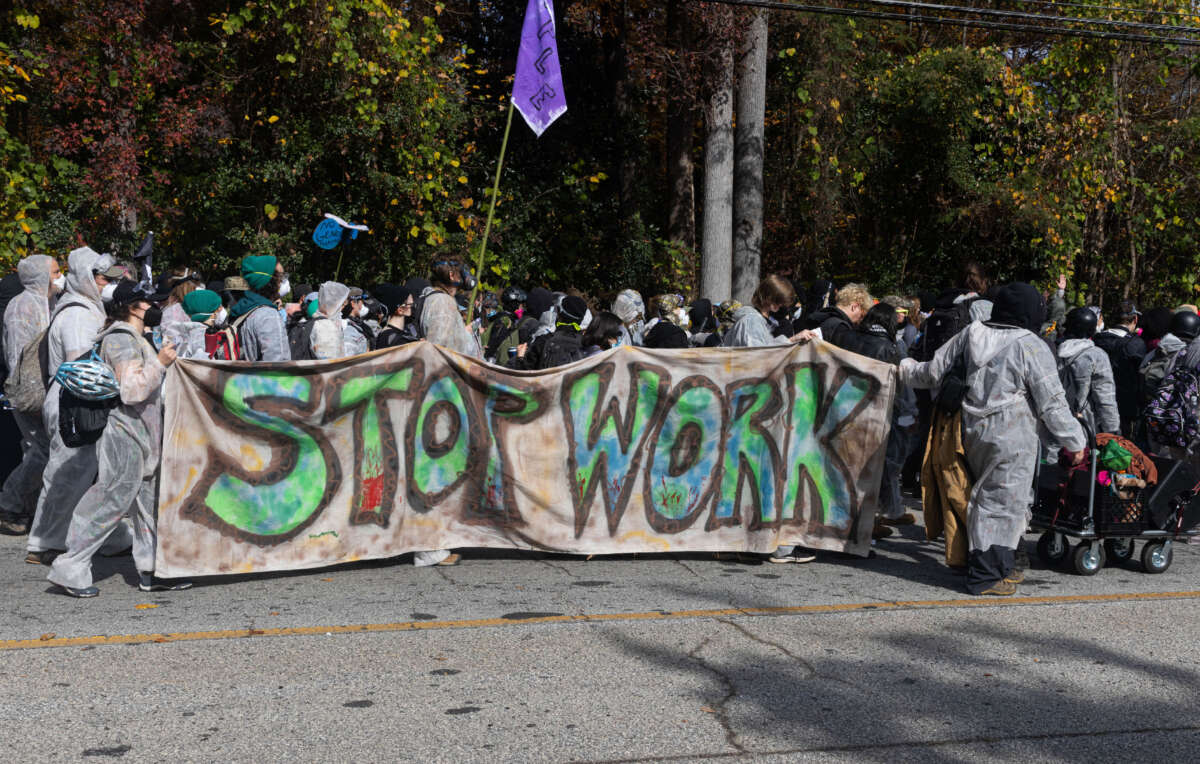
Protesters began marching behind banners that said “Defend the Forest, Defund the Police” and “We Are the People’s Stop Work Order.” All told, several hundred people turned out, many traveling from across the country for the mobilization. Understanding the legal and personal risks activists on the ground would incur, other activists worked behind the scenes to coordinate transportation, communications, legal defense and logistical support.
“Even small groups of people flyering at businesses or protesting on the streets in downtown Atlanta were being met with large groups of militarized police and helicopters.”
Organizers planned much of the action in public view. Block Cop City has a public website; activists recruited during speaking tour stops across the county that were open to anyone. As part of the community agreements, participants pledged to use neither weapons nor incendiary devices. Throughout the planning, activists pointed to an ethos of tactical nonviolent direct action. The demonstrators carried puppets and saplings, not weapons.
Protesters were met with armored vehicles and a line of police in riot gear. Activists marched through the police shields, shoving through the riot line, while others made a break for the fence surrounding the construction site. Police threw tear gas — first toward the press, then indiscriminately into the crowd of protesters. Amid police violence, protesters locked arms, stayed together and ensured that no one became separated from the crowd.
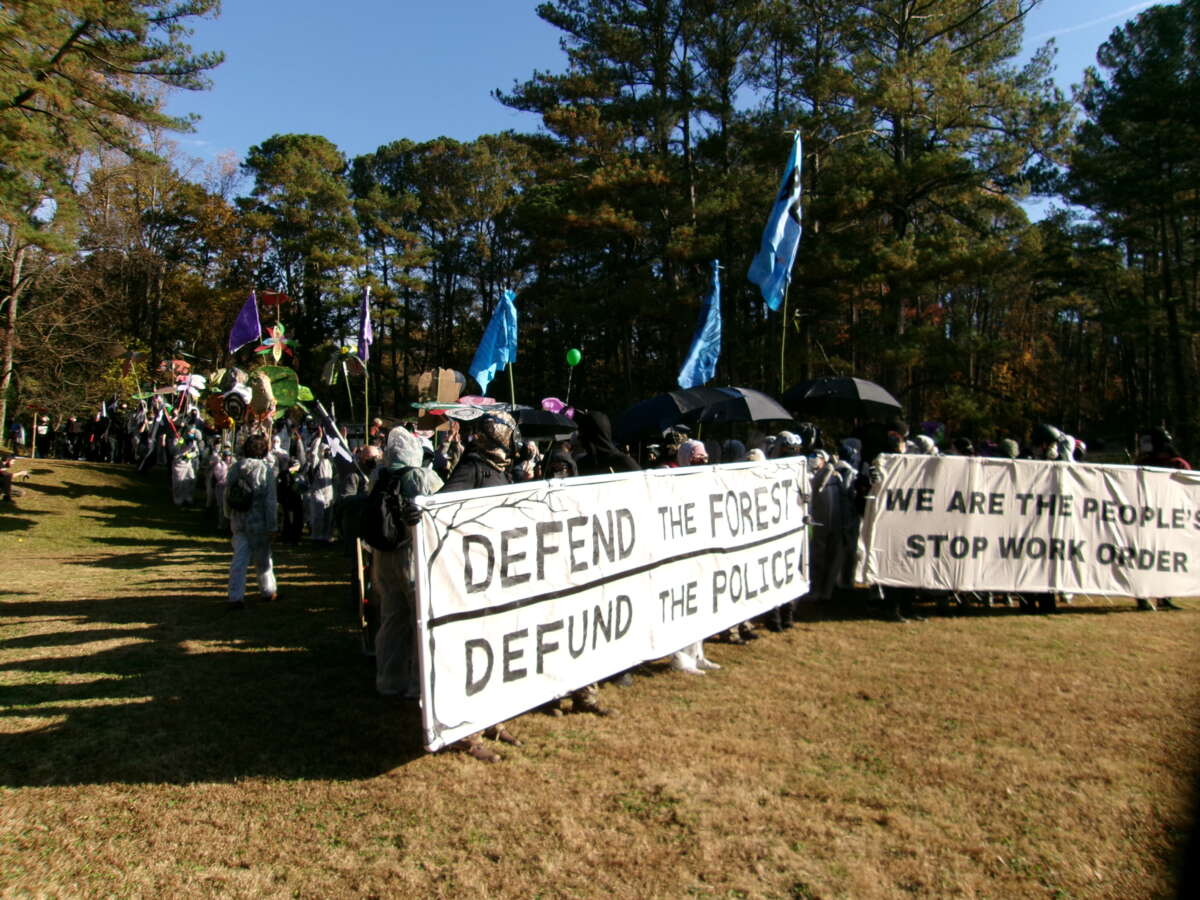
“At the March [5 week of action] music festival, people were randomly grabbed and charged with domestic terrorism,” said Miriam, who also requested a pseudonym, ahead of the Monday mobilization. “People were scattering and running away. It’s a different situation if I’m standing there with 200 or more people who have all gone in there deciding that we’re willing to face the risk.”
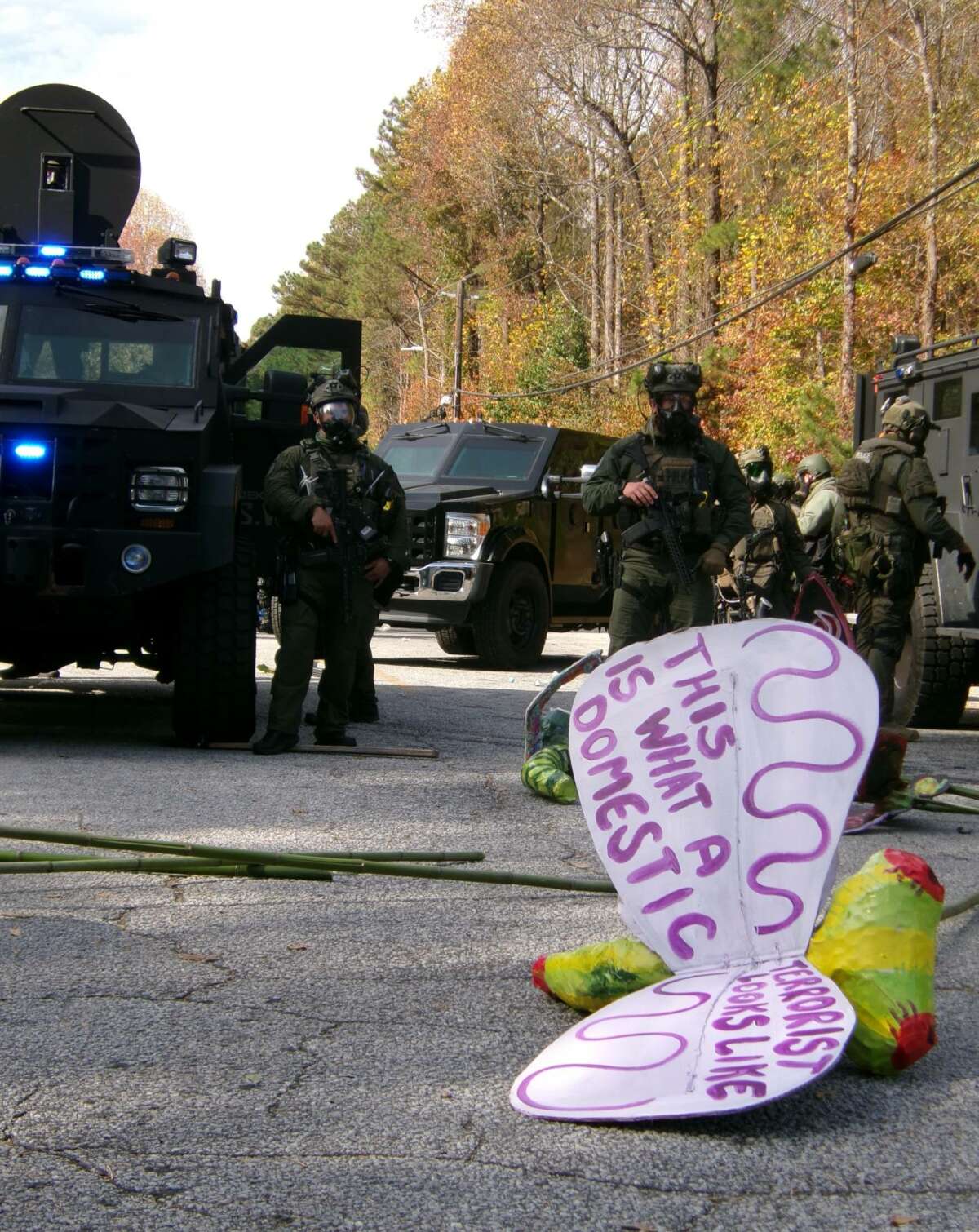
As police threw tear gas canisters, medics rushed in to help people clear their eyes. More police poured in, representing law enforcement agencies, such as the Georgia State Patrol, Atlanta Police Department (APD) and DeKalb County Police. DeKalb police brought an armored ramp assault vehicle labeled “The Beast.” Police dogs wearing anti-tear gas goggles were brought out of trucks. Other reporters were forced away from the demonstrators by police and threatened with arrest. Police continued to throw tear gas and flashbangs even as protesters retreated from the fence.
“It was so obvious today that the police were the aggressors,” said Block Cop City protester Steven Hall (a pseudonym) during a press conference after the event. “They sent everything after us. And we still chose not to respond because our community agreed not to. That takes democracy.”
Even in the chaos, protesters stayed tightly knit. As still more lines of riot police arrived, the march retreated along the same route. Only one arrest occurred offsite — a testament to the strength of collective organizing.
Fighting for Our Lives
On Friday, as part of the “Black Week of Action Against Cop City,” Black families protested at the APD Zone 3 Precinct, where the officer who shot and killed 27-year-old Black man Rayshard Brooks in 2020 was employed. At that precinct — and in Atlanta and across the country more broadly — the same pattern repeats over and over: Black men are killed by police with zero accountability. Between 2010 and 2015, Atlanta police killed 171 people. Not a single police officer has been convicted of a crime. The parents of two men killed by APD, Jimmy Atchinson and Eric Holmes, brought large photographs of their children. Atchinson was only 21 years old; Holmes was 19. Neither officer has been convicted, though the officer who killed Atchinson has been indicted and awaits trial in federal court. The families, though, aren’t overly optimistic: they have seen this play out before.
“If you want your jobs,” Holmes’s mother Vakelvion Holmes yelled at the police surveilling the protest from the precinct roof, “we want our lives.”
The Black families’ march ended at a cemetery, where many organizers found symbolic resonance. For Black people in Atlanta, the fight against Cop City — and policing more broadly — is a fight for their lives and the lives of Black and Brown people everywhere.
“It was so obvious today that the police were the aggressors. They sent everything after us.”
“If we’re not fighting, this is where we ending up,” said one of the speakers. The crowd chanted the endless litany of the dead — among them, Manuel Esteban Paez Terán, the Defend the Atlanta Forest activist known as “Tortuguita” who was shot and killed by a team of Georgia state troopers earlier this year.
“We have a duty to fight for justice, we have a duty to win,” the crowd chanted. Cop City marks an escalation in the level of police militarization and violence that has long devastated communities, with Black families hit the hardest.
Planting Alternative Futures
The family members of Black men who have been killed by police have shown up at prosecutors’ offices and protest marches for years, calling for an end to the deadly institutions of policing that have killed their children. As a grim reminder of her murdered son, Belkis Terán, the mother of Tortuguita, is a constant presence at Stop Cop City protests and vigils. At a protest outside the Cop City construction site gates on Friday, she spoke through a bullhorn, her back to the road, speaking directly to the police stationed inside the fence.
“Cop City is built on the blood of my son,” Terán said. “He gave his life for a better world.”
On the day of the Block Cop City march, activists slung tree seedlings across their backs. They brought native plants, including White Oak, Table Mountain Pine, Bur Oak, Shumard Oak and elderberry. One tree at a time, they planned to begin the healing process for the forest, and hoped to cut off Cop City as one of the tips of the spear of militarized policing.
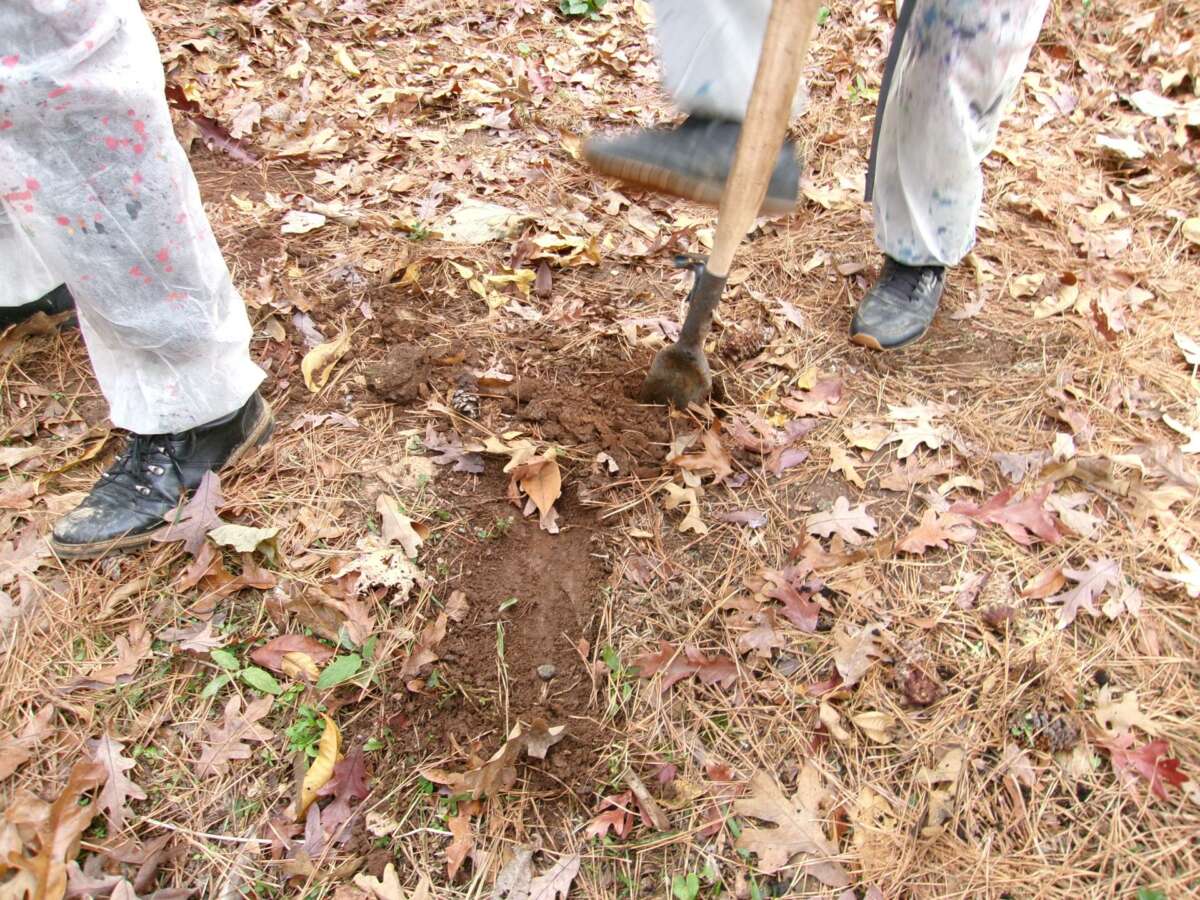
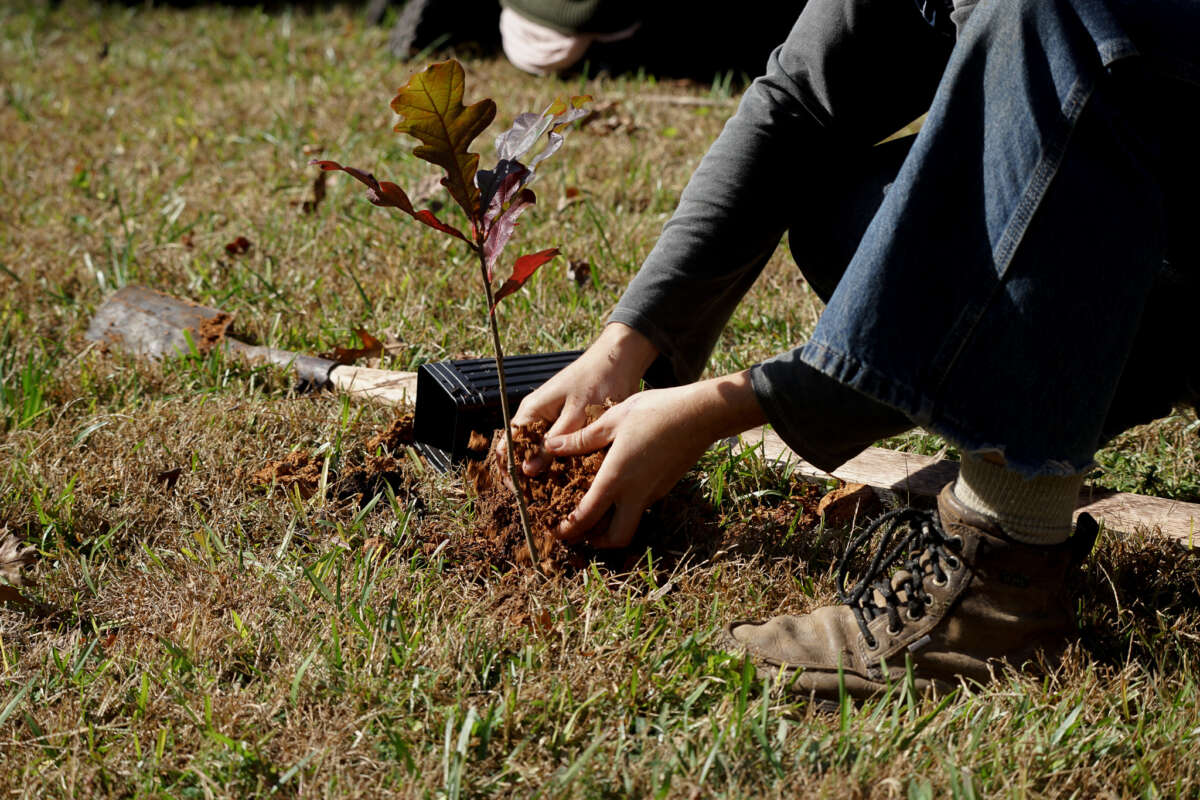
Instead, the protesters were tear gassed before they could make it onto the site. At a police press conference later in the day, APD Chief Darin Schierbaum alleged that the spades protesters brought to plant the trees were “makeshift weapons” — never mind the fact that many protesters cast them aside during the scuffle.
Still, on the march back, those who had retained their spades hastily planted trees along the fence line. The hope remains that one day, those trees can be planted on Cop City’s grave.
Media that fights fascism
Truthout is funded almost entirely by readers — that’s why we can speak truth to power and cut against the mainstream narrative. But independent journalists at Truthout face mounting political repression under Trump.
We rely on your support to survive McCarthyist censorship. Please make a tax-deductible one-time or monthly donation.
